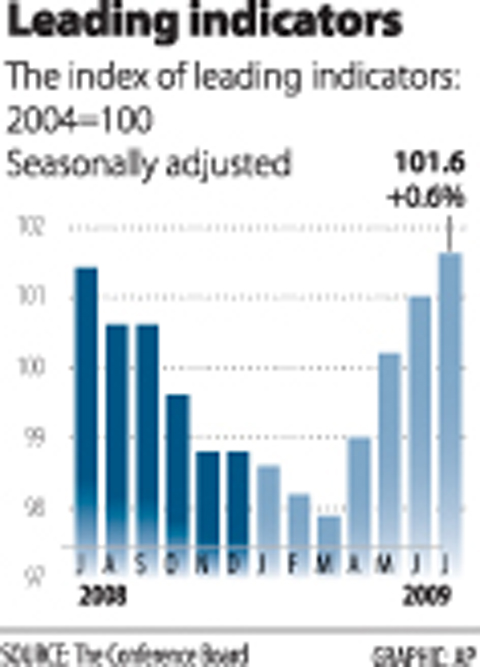Asian currencies declined for a second week, led by South Korea’s won and the Indian rupee, on concern tighter credit in China will curb spending in the world’s fastest-growing major economy.
The Bloomberg-JPMorgan Asia Dollar Index, which tracks Asia’s 10 most-used currencies excluding the yen, this week reached its lowest level in a month as the Shanghai Composite Index of shares dropped 2.8 percent.
The won dropped 0.9 percent from the end of last week to 1,249.85 per dollar in Seoul, according to data compiled by Bloomberg. The rupee lost 0.7 percent to 48.605 and the Indonesian rupiah slid 0.6 percent to 10,015.

The New Taiwan dollar rose 0.2 percent on Friday to NT$32.906 after second-quarter GDP figures showed Taiwan is recovering from a recession. The economy contracted 7.5 percent from a year earlier, less than the 10.1 percent recorded for the first quarter and the 7.8 percent forecast by economists in a Bloomberg survey. The NT dollar was little changed this week.
The Philippine peso was little changed in offshore trading as local markets were shut for a holiday on Friday. The currency slumped 0.8 percent this week, the most in two months, after the government on Wednesday reported a budget deficit of 188 billion pesos (US$3.9 billion) for the last seven months, equivalent to 75 percent of its full-year projection.
Elsewhere, Thailand’s baht was little changed for the week at 34.01 per US dollar and the Chinese yuan was at 6.8312, having barely moved from 6.8342 last Friday. Malaysia’s ringgit gained 0.1 percent to 3.5125.
The US dollar and yen fell against the majority of their most-traded counterparts as US housing and manufacturing reports signaled that the economy is recovering from recession, easing demand for the currencies as a refuge.
The euro also rose on the week against the dollar and yen as German services and French manufacturing unexpectedly expanded this month.
The greenback slumped 0.9 percent to US$1.4326 per euro on Friday from US$1.4203 on Aug. 14, while also dropping more than 1 percent against the South African rand, Swedish krona, Canadian dollar and Swiss franc. The yen fell 0.3 percent to ¥135.21 per euro, from ¥134.84 last week. Japan’s currency also declined versus the rand, krona and franc. The dollar fell 0.6 percent this week to ¥94.38.
The Federal Reserve Bank of Philadelphia’s general economic index climbed to 4.2 from minus 7.5 last month, the bank said on Thursday. Positive readings signal an expansion. The leading US economic indicators rose last month for a fourth consecutive month, the Conference Board reported separately the same day.

ALL-IN-ONE: A company in Tainan and another in New Taipei City offer tours to China during which Taiwanese can apply for a Chinese ID card, the source said The National Immigration Agency and national security authorities have identified at least five companies that help Taiwanese apply for Chinese identification cards while traveling in China, a source said yesterday. The issue has garnered attention in the past few months after YouTuber “Pa Chiung” (八炯) said that there are companies in Taiwan that help Taiwanese apply for Chinese documents. Minister of the Interior Liu Shyh-fang (劉世芳) last week said that three to five public relations firms in southern and northern Taiwan have allegedly assisted Taiwanese in applying for Chinese ID cards and were under investigation for potential contraventions of the Act Governing

‘INVESTMENT’: Rubio and Arevalo said they discussed the value of democracy, and Rubio thanked the president for Guatemala’s strong diplomatic relationship with Taiwan Guatemalan President Bernardo Arevalo met with US Secretary of State Marco Rubio in Guatemala City on Wednesday where they signed a deal for Guatemala to accept migrants deported from the US, while Rubio commended Guatemala for its support for Taiwan and said the US would do all it can to facilitate greater Taiwanese investment in Guatemala. Under the migrant agreement announced by Arevalo, the deportees would be returned to their home countries at US expense. It is the second deportation deal that Rubio has reached during a Central America trip that has been focused mainly on immigration. Arevalo said his

‘SOVEREIGN AI’: As of Nov. 19 last year, Taiwan was globally ranked No. 11 for having computing power of 103 petaflops. The governments wants to achieve 1,200 by 2029 The government would intensify efforts to bolster its “Sovereign Artificial Intelligence [AI]” program by setting a goal of elevating the nation’s collective computing power in the public and private sectors to 1,200 peta floating points per second (petaflops) by 2029, the Executive Yuan said yesterday. The goal was set to fulfill President William Lai’s (賴清德) vision of turning Taiwan into an “AI island.” Sovereign AI refers to a nation’s capabilities to produce AI using its own infrastructure, data, workforce and business networks. One petaflop allows 1 trillion calculations per second. As of Nov. 19 last year, Taiwan was globally ranked No. 11 for

STAY WARM: Sixty-three nontraumatic incidents of OHCA were reported on Feb. 1, the most for a single day this year, the National Fire Agency said A total of 415 cases of out-of-hospital cardiac arrest (OHCA) occurred this month as of Saturday, data from the National Fire Agency showed as doctors advised people to stay warm amid cold weather, particularly people with cardiovascular disease. The Central Weather Administration yesterday issued a low temperature warning nationwide except for Penghu County, anticipating sustained lows of 10°C or a dip to below 6°C in Nantou, Yilan, Hualien and Taitung counties, as well as areas north of Yunlin County. The coldest temperature recorded in flat areas of Taiwan proper yesterday morning was 6.4°C in New Taipei City’s Shiding District (石碇). Sixty-three nontraumatic OHCA